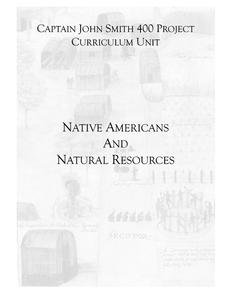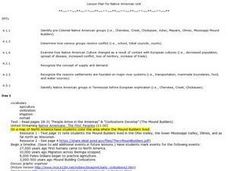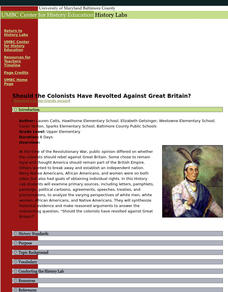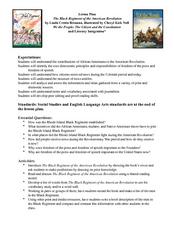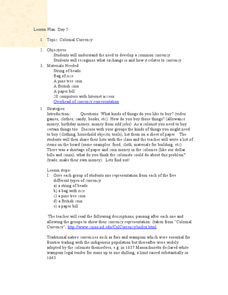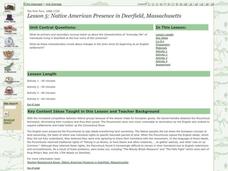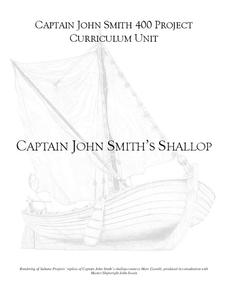Curated OER
Modern Interpretations
To conclude an eight-instructional activity study of the events that occurred in the early colonial period in Deerfield, Massachussetss, class members evaluate the point of view and bias found in late 19th and early 20th...
Curated OER
Native Americans and Natural Resources
North American Indian civilizations had already been in place for over 10,000 years before the arrival of European settlers. Introduce your young historians to Indian tribes that lived in the Chesapeake region in the...
Curated OER
Native American Groups
These slides are attractively designed but some contain a lot of text. Cherokee, Creek, Chickasaw, Aztec, Mayan, Olmec, and Mississippi Mound Builders are the pre-colonial Native American groups detailed in this PowerPoint....
Curated OER
Colonial North America
Showcase the religion, conflicts, daily life, and politics of Colonial North America. A very well-done presentation highlights all the major colonial groups, social norms, demographics, and political struggles of the time. Perfect for an...
Curated OER
Choosing Sides: The Native Americans' Role in the American Revolution
High schoolers analyze the different roles assumed by various Native American tribes during the American Revolution. They examine the issues involved for Native Americans in choosing the British or the American side of the conflict, such...
Curated OER
Lesson 1: English-Indian Encounters
What did the English settlers think of the Native Americans inhabiting the Chesapeake region of the United States? Learners analyze a series of documents and images to determine the English perception of the local inhabitants. A great...
Curated OER
Lives of Native Americans and Settlers
Students assess the effect of contact between the Native Americans and Europeans after 1492. They explore the lives of the early European colonists and the Native Americans living along the East Coast of North America. Lesson contains...
Curated OER
A River, Dead or Alive: Native Americans and European Colonists' Treatment of a River
Students write an expository paragraph about the uses of the Nashua River for the Native Americans and the European Colonists. In this river uses lesson plan, students determine the causes and effects of both parties using the river.
Curated OER
The Affects of Environment on Native American Culture
Students research the culture of the Native Americans. In this U.S. History lesson, students are given the major geological areas where the Indians lived prior to the arrival of the Europeans, then they create a notebook that...
Curated OER
Pre-Colonial Native American Groups
Students investigate U.S. history by researching the Internet and taking a test. In this American Indian group lesson plan, students identify the many specific Native American tribes and their geographic locations. Students research the...
University of California
Impact of the California Missions on Native Americans
While the Spanish claimed to bring civilization to California indigenous peoples, in reality, they also brought violence and forced assimilation to European values. Primary sources, such as the reports of Catholic priests and Europeans...
Smithsonian Institution
We Have a Story to Tell: Native Peoples of the Chesapeake Region
How did colonial settlement and the establishment of the United States affect Native Americans in the Chesapeake region? Your young historians will analyze contemporary and historical maps, read informational texts, and work in groups to...
Stanford University
Native Californians and the Portola Expedition
What was California like before the Spanish came? Class members discover the answer to the question using images of Native Americans and diaries of the early Spanish explorers. Scaffolded activities allow instructors to adapt the...
National Endowment for the Humanities
Empire and Identity in the American Colonies
The American Revolution was born out of a European conflict that spilled over into North America—and the documents prove it! Using primary sources from the era of the French and Indian War, including British plans to try to unite its...
Curated OER
Native American Philanthropists
Students demonstrate how Native Americans were philanthropic. In this philanthropy lesson plan, students read Squanto's Journey and brainstorm ways that the Native Americans were helpful towards the Pilgrims. Students reflect on the...
Center for History Education
Should the Colonists Have Revolted Against Great Britain?
Should the Americans have taken the plunge and revolted against Great Britain? Using documents, including the famed Common Sense and a Loyalist response, pupils conduct a lengthy investigation of the question. The interesting resource...
Curated OER
Third Grade Social Studies- Quiz
In this social studies worksheet, students complete a 25 question multiple choice quiz about early American colonial life and the Cherokee and other Native American tribes.
New York City Department of Education
Colonial America and The American Revolution
How did the founding of the American colonies lead to a revolution? Use the essential question and sample activities to guide learners through a series of history lessons. Additionally, the packet includes effective strategies to...
Annenberg Foundation
Colonial Designs
The adventures of the New World came at a cost for Native Americans. Scholars investigate the economic side of settling the European colonies. Using video clips, statistical evidence, and primary sources, they create hypotheses and...
Curated OER
Harvesting the New World: Changing Land Uses and Contact Between Cultures in Colonial Times
Ninth graders differentiate the Native American and European values. In this world history lesson, 9th graders define colonialism in their own words. They study the effects of epidemics and other diseases to Native American populations.
Curated OER
We the People: The Citizen and the Constitution: The American Revolution
The contributions of African-Americans to the American Revolution are the focus of this Social Studies and language arts lesson. After reading and discussing Linda Crotta Brennan’s The Black Regiment of the American Revolution, class...
Curated OER
Colonial Currency
Fifth graders develop a common currency. In this colonial currency lesson, 5th graders exchange beads, rice, coins, and paper bills for goods and services. Students explore web tools to research ways colonists used money, even if it was...
Curated OER
Native American Presence in Deerfield, Massachusetts
Eleventh graders examine how in this volatile period, colonial powers and Native groups competed for trade goods and land, coming into conflict repeatedly. They also explore primary and secondary sources.
Curated OER
Captain John Smith's Shallop
Young explorers, all aboard the shallop to discover how early European explorers would navigate the American coastline to find resources, map terrain, and trade with Native American tribes.



